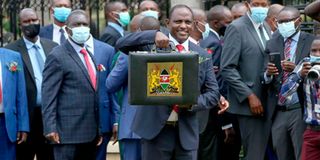Key highlights of the 2021/22 budget allocations

National Treasury Cabinet Secretary Ukur Yatani at Parliament buildings ahead of the reading the 2021/2022 budget on June 10, 2021.
Government Expenditure and Net Lending - Sh3.03 trillion
Ministerial Recurrent Expenditure - Sh1.27 trillion
Ministerial Recurrent Expenditure include Judiciary - Sh15.6 billion and Parliament Sh35.8 billion
Ministerial Development Expenditure - Sh669.6 billion
Interest Payments and Pensions - Sh697.5 billion
Contribution to civil servant pensions - Sh20.8 billion
Equitable share to Counties - Sh370 billion
Supporting Manufacturing for job creation - Sh20.5 billion
Enhancing Food and Nutrition Security to all Kenyans - Sh60 billion
Providing Universal Health coverage to guarantee quality and affordable healthcare to all Kenyans – Sh47.7 billion
Provision of Affordable and Decent Housing for all Kenyans – Sh13.9 billion
Economic Recovery Strategy – Sh23.1 billion
Enhanced security for stability, investment and growth – Sh302.1 billion
Investing in infrastructure to unlock growth potential – Sh310.7B billion
Enhancing access to quality education outcomes – Sh202.9 billion
Environment management and protection, flood control and water harvesting – Sh93.2 billion
Equity, poverty reduction & social protection for vulnerable groups – Sh103.4 billion
Leveraging on Information, Communication and Technology – Sh23 billion
Sh409.8 billion - Transfer to County Governments Including: Equitable Share Sh370billion and Conditional Allocation Sh39.8 billion
Taxes
Customs Measures
• Finished Iron and steel products to be imported at 25 per cent or corresponding specific rate;
• Import duty on leather and footwear products at 25 per cent or corresponding specific rate;
• Unassembled motorcycles at 10 per cent under Duty Remission Scheme.
• Inputs used in textile and apparel sector at 0 per cent under the Duty Remission Scheme;
• Import duty on furniture products at 35 per cent duty rate;
• Inputs for manufacture of baby diapers at 0 per cent under Duty Remission Scheme;
Value Added Tax Measures
• VAT exemption on Health Products and Technologies to boost health sector.
• VAT exemption on goods used in geothermal, oil and mining projects.
• VAT exemption on equipment for generation of solar and wind energy.
• Transitional VAT exemption on goods used in power generation under power purchase agreements
• VAT exemption for asset transferred to Real Estate Investment Trusts and Asset Backed Securities
• Bread exempt from VAT instead of being both exempt and zero rated.
Excise Duty Measures
• Rebate on excise duty paid on internet data services purchased in bulk for resale.
• Excise duty on locally manufactured sugar confectionary and white chocolate.
• Removed excise duty on imported glass bottles.
• Changed excise duty rate on Motorcycles from Sh11,608.23 per unit to 15 per cent.
• Excise duty on nicotine pouch at Sh5,000 per kg.
• Excise duty on betting at 20 per cent of amount wagered.
Income Tax Measures
• Removal of limitation for carrying forward of losses under Section 15(4) of income Tax Act
• Thin capitalisation rule changed from debt-to-equity ratio to 30 per cent of earnings before interest, taxes, depreciation and amortization.
• National Health Insurance Fund to qualify for insurance relief.
• Tax rebate extended to employers engaging TVET graduates as apprentice.
• Management and professional fees under the extractive sector harmonized with service fees, in the same sector, at 10 per cent.
Fees and Levies
• Import Declaration Fee (IDF) and Railway Development Levy (RDL) exemption on goods in imported public interest, or to promote investment above Sh5 billion.





